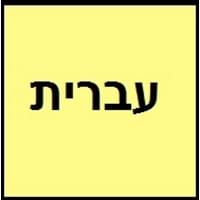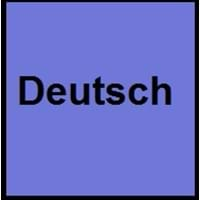Countries
Israel
Austria, Belgium, Germany, Italy, Liechtenstein, Luxembourg, Switzerland
National Language
Israel
Germany
Second Language
Israel
North Dakota, United States of America
Speaking Continents
Africa, Asia, Europe
Europe
Minority Language
Poland
Czech Republic, Denmark, Former Soviet Union, France, Hungary, Italy, Namibia, Poland, Romania, Slovakia, Slovenia
Regulated By
Academy of the Hebrew Language
Council for German Orthography
Interesting Facts
- The original language of Bible is Hebrew.
- The men and women use different verbs in hebrew language.
- One of the large group of Indo-Germanic languages is German.
- The second most popular Germanic language spoken today behind English is German language.
Similar To
Arabic and Aramaic languages
Dutch, Danish, Norwegian, Swedish and English Languages
Derived From
Aramaic Language
Albanian Languages
Alphabets in
Hebrew-Alphabets.jpg#200
German-Alphabets.jpg#200
Writing Direction
Right-To-Left, Horizontal
Left-To-Right, Horizontal
Hello
שלום (Shalom)
hallo
Thank You
תודה (Toda)
Danke
How Are You?
מה שלומך? (ma shlomxa)
Wie geht es dir?
Good Night
לילה טוב (Laila tov)
gute Nacht
Good Evening
ערב טוב (Erev tov)
guten Abend
Good Afternoon
אחר צהריים טובים (Achar tzahara'im tovim)
guten Tag
Good Morning
בוקר טוב (Boker tov)
guten Morgen
Please
בבקשה (bevekshah)
bitte
Sorry
סליחה! (Slicha)
Verzeihung
Bye
להתראות (Lehitraot)
Tschüs
I Love You
אני אוהבת אותך (Ani ohevet otcha)
Ich liebe dich
Excuse Me
בבקשה!
Entschuldigung
Dialect 1
Ashkenazi Hebrew
Swiss German
Where They Speak
Israel
Switzerland
How Many People Speak
Not Available
Dialect 2
Samaritan Hebrew
Swabian German
Where They Speak
Israel, Palestine
Germany
How Many People Speak
Not Available
Dialect 3
Yemenite Hebrew
Texas German
Where They Speak
Israel
Texas
How Many People Speak
Not Available
Speaking Population
Not Available
Native Name
עברית / עִבְרִית (ivrit)
Deutsch
Alternative Names
Israeli, Ivrit
Deutsch, Tedesco
French Name
hébreu
allemand
German Name
Hebräisch
Deutsch
Pronunciation
[(ʔ)ivˈʁit] - [(ʔ)ivˈɾit]
[ˈdɔʏtʃ]
Ethnicity
Not Available
Germans
Origin
1000 BC
6th Century AD
Language Family
Afro-Asiatic Family
Indo-European Family
Subgroup
Semitic
Germanic
Branch
Canaanitic
Western
Early Forms
Biblical Hebrew, Mishnaic Hebrew, Medieval Hebrew, Hebrew
No early forms
Standard Forms
Modern Hebrew
German Standard German, Swiss Standard German and Austrian Standard German
Signed Forms
Signed Hebrew
Signed German
Scope
Individual
Individual
ISO 639 6
Not Available
deus
Glottocode
hebr1246
high1287, uppe1397
Linguasphere
12-AAB-a
52-ACB–dl & -dm
Language Type
Living
Living
Language Linguistic Typology
Subject-Verb-Object, Verb-Subject-Object
Subject-Object-Verb, Subject-Verb-Object
Language Morphological Typology
Fusional, Synthetic
Fusional, Synthetic
Hebrew and German Greetings
People around the world use different languages to interact with each other. Even if we cannot communicate fluently in any language, it will always be beneficial to know about some of the common greetings or phrases from that language. This is where Hebrew and German greetings helps you to understand basic phrases in Hebrew and German language. Hebrew word for "Hello" is שלום (Shalom) or German word for "Thank You" is Danke. Find more of such common Hebrew Greetings and German Greetings. These greetings will help you to be more confident when conversing with natives that speak these languages.
Hebrew vs German Difficulty
The Hebrew vs German difficulty level basically depends on the number of Hebrew Alphabets and German Alphabets. Also the number of vowels and consonants in the language plays an important role in deciding the difficulty level of that language. The important points to be considered when we compare Hebrew and German are the origin, speaking countries, language family, different greetings, speaking population of these languages. Want to know in Hebrew and German, which language is harder to learn? Time required to learn Hebrew is 44 weeks while to learn German time required is 30 weeks.





